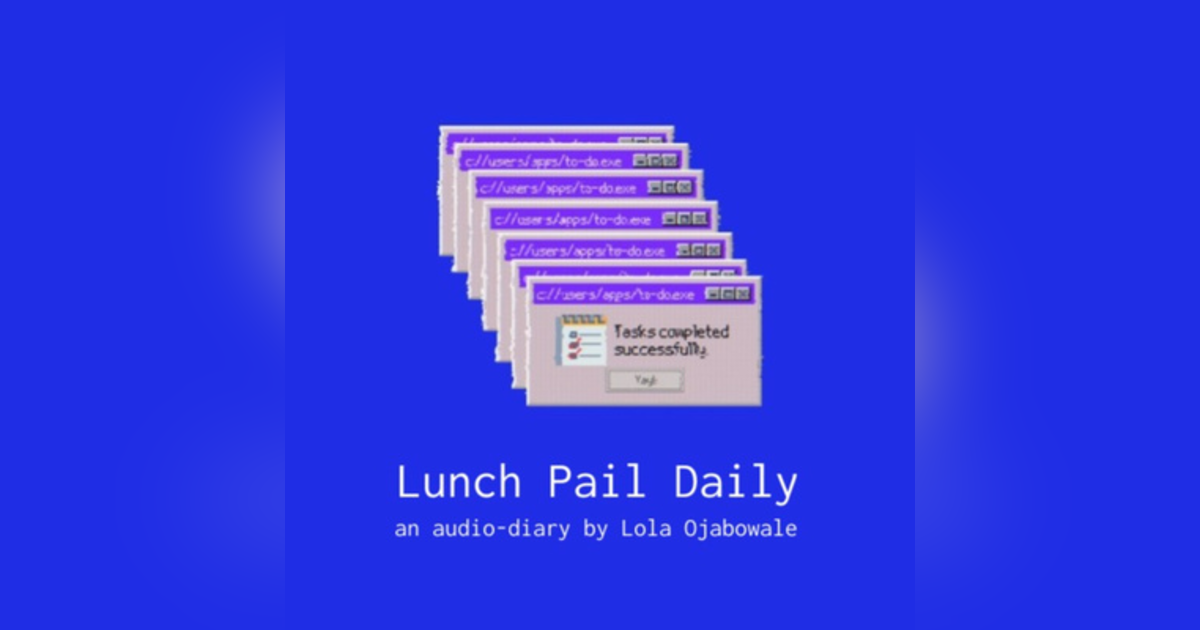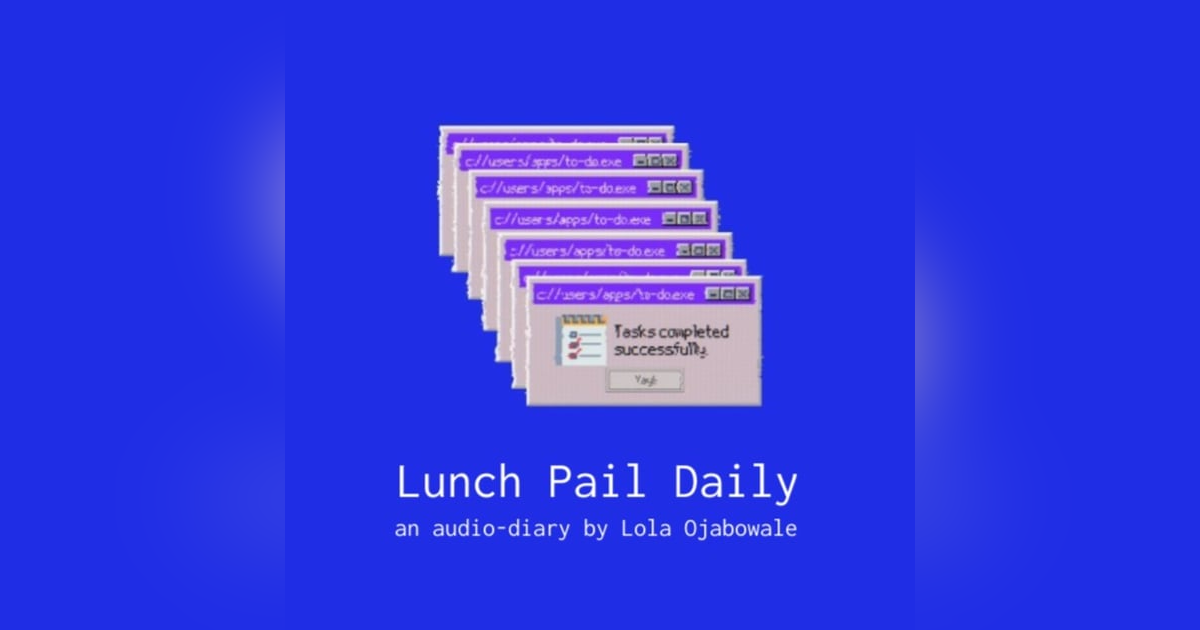#274 — 🧱 the lego economy

Hellooo friends 👋🏿 Jamming in this episode about some more insights from my super deep dive on the lego economy what are some of the ways companies are monetizing? Tune in to find out!
Hey what's up everybody?
This is Lola Ojabowale, founder of Lunch Pail Labs. Welcome back to Lunch Pail Daily, my personal audio diary on building and growing lunch pail Labs, which is a digital product studio based out of Atlanta, Georgia. In today's episode, we're gonna jam about this Lego economy. What are the different parts of the Lego economy that I'm seeing the API economy, the borrow, rent and add functionality and business capabilities to your products and businesses economy? Basically, based on all of this, like deep dive research I've been doing over the past week, aggregating a super, super long list of all of the companies that I can find that add this functionality, mostly for makers to use. So they know what to, you know, use for their what to look at to bring bring functionality. So I think today's kind of episode will focus more on what I'm seeing with like API's specifically. But I think there's also a lot of interesting work going on in with like, I guess people are writing components, I don't know what you would call them, like, a UI kit is in some way, a way you can borrow or rent functionality or design, or like a framework.
But yeah, you can call an API. But anywho today,
we're gonna really focus on here API's. So some of the stuff that I'm seeing, which I think save for the really, really big and obvious ones, I think are going to be that I'll mention in a minute are actually kind of cool. So like let's get into it. First, we have like the sort of obvious parts of this API economy, Lego economy, the companies whose products whose main product is selling the API's or the the Lego so think things like message bird, checker, Twilio, Stripe, Daily. And tons of companies kind of monetizing that way. I think it's also it's interesting. I was recently listening to this talk by the loom VP of product. And they were talking about their decision to create a loom SDK, it was kind of like looms, platform play have like being the way to add an embed async video functionality into your applications. And I never really thought of like an API or an SDK as like a platform play. And I also, I feel like I hear like, oh, this company is trying to be a platform. And I never really knew what that means. But it sounds like perhaps like these, a lot of these API companies are kind of platforms and in ways where a lot of companies get to build on top.
The next kind of big category of products that I'm I'm seeing are these, like, I guess the easiest way to describe it is their packaging, the API that exists or the packaging the Lego and making it just like a little more user friendly for like a non technical user, especially I think, in the case of API's. And I'd say it's a little bit different than people who are incorporating the technology for a use case beyond the same use case of the API. So you know, some examples of this. I mentioned some of these yesterday, but you have like your copy AI or anywords, companies that are basically doing what open AI or like GPT 3 does, but you don't have to use an API, you can use their interface to generate language and things like that. So they kind of just like, plop some stuff on there. Even I think a lot of the code autocomplete companies, I don't know which companies are using Codex's open API's sort of code, autocomplete engine, but it also feels like a similar vibe, like, Yes, that's what Codex does. And you're like putting an easier to use interface on top of Codex. As opposed to like, oh, like using code autocomplete for some other application or industry.
So definitely a category of that I think those sound like kind of cool even like micro saas ideas even looking at the the list of there are a lot of like really, really interesting API's some that I mentioned yesterday, that can be that probably could have like a nice blue plop it on top interface to to make it easier for a non technical person or like an end user to like, use and interact with the information on like a one off case. Another one One that I think is really, really interesting is BrandFetch. And they have this massive API to get all sorts of brand info. And you can also search by brand with their product as well. Or search by a brand specifically in their product. I think these like plop on top cases that people build are probably going to be the more likely to just like, be taken by that that API company. So it was also something I saw really often, where people would have the API, but they also kind of have a solution that works for that one off case, or like, has like a basic kind of like pre built thing that you can use. So that's pretty, pretty cool.
It's pretty neat. So there's that angle of popping on top, then a lot of interesting, bundled API access or multiple API connections, I guess people call them like, maybe integration platforms as a service (IPAAS) or unified API's saw quite a few of those. And they seem to kind of solve multiple problems one API discovery, I have just been floored in my research of like, all these API's, I did not know all these even like things that are like functionality, you can rent, highlighting text or like medium and all those other stuff, all this stuff, you know, putting some stock market data, building remittance, easily convert text between different letter cases, like just like all of this, like different functionality. And so I think the unified API's and the integration sort of platforms, as a service kind of companies want help with discovery of API's that are useful, that useful functionality. And then also with the merging, I probably mentioned this a couple times on the podcast. But yeah, by the time a company has, I think it's like 35 employees, they already have 100, plus SAS tools. We're all using apps and services and SAAS in an ecosystem.
So I think these companies that are making it easier to discover what to add to your ecosystem, and then connect to that, it's pretty, pretty cool. One that I really, really liked that's relatively new is this company called merge. And they provide a unified API for integrating for all like, it's almost all of your business system. So HR, payroll, recruiting, accounting, ticketing and CRM, I think it's so cool, because I feel like there can be very nice like, use cases where people can go really, really deep when they kind of take a suite or a category. There are other kinds of bundled API's rapid API is one, I think they just raised a crazy amount of money. And now they're a billion dollar company. Phantom Buster, no code API kind of tackles it for like the no code apps kind of having a way to connect to different things, and path effects. And it's so funny, I think early in my like, no code, low code development kind of journey, I ran to some of these companies, but they're always just like, felt a little bit too broad, in the sense that it was just like, oh, there's like a random sampling of integrations. So the thing that is really, really, really cool about Merge is that they kind of go deep on these like, kind of business software type integrations. And with that, they can get really, really specialized, they can really have a full full suite there. And I think as like a maker or business owner, you can be like, Oh, yes, this is the tool that's just gonna handle all of my HR kind of integrations. And I'm just gonna think about it that way. As opposed to, I think some other companies who have gone the route of like, these are just like some random set of integration that I may or may not find relevant, maybe I'll find a couple that are relevant. But it's not really going to be everything that I need for my app. So yeah, kudos to that. And maybe there'll be more companies that are kind of like merge that take these slices, like, I'm sure you know, I don't know you could probably do something like this for like all the new code platforms or all of the kind of like maker integrations. I feel like there are a few plugins that everybody uses stripe. You know, you're gonna use something for communications Twilio, like getting you something for email like the the maker suite So I will definitely, especially post, I think post doing all this Lego research, I'll do some deep diving into I guess what else what next kind of what can be built there. And this creating a unified API or creating an integration platform and service, I have no idea where that even how to even do that from like a technical perspective. But it seems really interesting to research. And I think I'll definitely check it out.
Also, a lot of problems though, one thing I've noticed with some of these unified API's is like the pricing can be like bonkers. One of the companies it was like, there were multiple pricing, but it was different units, it was like, it's six cents per customer. And then $20 per account, and then $5 here, and it's like that just sounds like a real like a nightmare. And then some had the like, oh fine, you get this many API calls, which probably get like a nice like, wash, you know, some API's will be more expensive, you lose out others won't be as expensive, you kind of figure out kind of all inclusive pricing kind of makes sense to me.
And then the last one are these like supporting API's like such the API economy, I feel like I ran into a lot of API documentation software. Blob being a new one that looks really interesting that lets you kind of spin up API portals, a lot of uptime services specifically geared to monitoring API's, security companies for API's. So as these legos get more and more popular, I think we'll see a whole suite whole suite of companies that are really targeting, supporting that that industry.
And so yeah, maybe the last piece just for my, my fullness, I wonder what services are actually happening in this industry? If not, if anything. So yeah, yeah, definitely. Definitely things to look at. So all very interesting, can't wait to dig in more hoping that in the next week or so, having this fully developed and launched and shared, and I'll share my learnings and all that stuff and move on to the next fun experiment. That's all for me. I hope you all have a wonderful Thursday and I'll catch you all later.






